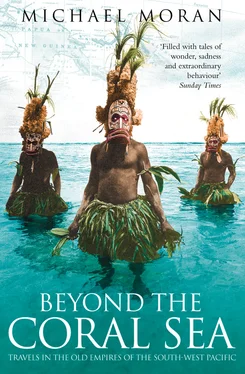I would be staying at Masurina 1 Lodge, run by Chris Abel, grandson of the missionary Charles Abel. I had never met him, but I had read a great deal about his unique regional business. In 1973 Alotau was a tiny place consisting of five trade stores and a post office. Chris established the Alotau Tea Shop with the help of Mila Walo (‘Aunty Mila’), one of the outstanding women who emerged from Charles Abel’s Kwato Mission. This tea shop was the forerunner of a large local public company called Masurina that Chris Abel established at Milne Bay, with interests ranging from accommodation to fisheries and construction. The local people of Milne Bay are major shareholders in what has become a symbol of the commercial way forward in modern PNG. I wanted to visit Samarai Island and the Kwato Mission and talk to Chris about his controversial forebear.
‘The Lodge’, as it is known locally, is situated high above the harbour and has the flavour of an early South Seas colonial resort with prefabricated units painted with large blue numbers. Reception and what might be termed a drinks veranda have a pleasant colonial atmosphere. A number of fans were ranged along the balustrade to keep the air moving and the mosquitoes at bay. My room overlooked the last thrust of the Owen Stanley Ranges, a line of jagged peaks heading down to the sea. Coconut palms crowned the hill above my writing table and from a garden below, a disembodied, unearthly monody sung by a child floated on the breeze. A dog barked in a distant valley. The weather felt unstable, the peaks shrouded in knotted clouds that were cut by the occasional flicker of lightning followed by sombre thunder.
A couple of attractive local girls with engaging smiles were looking after reception and talking quietly in the Tavara language. A figure sat at a table drinking beer and reading. He wore olive-green officer’s fatigues as part of his tropical kit, the crown of his Australian Akubra hat covered with a colourful woollen cap from the Highlands. A furled racing umbrella was propped against the arm of the chair. Some artefacts and a slim volume entitled Betel-Chewing Equipment of East New Guinea lay on the bamboo table. Clear, grey eyes and a welcoming face framed by a well-trimmed beard greeted me as he lowered his clip file.
‘Come and sit down. Get yourself a beer.’
It was a relief to relax near regular puffs of air from the fan. Carrying my luggage the short distance to my cabin had sent the sweat streaming down my face. Any movement in this sweltering heat apart from drinking seemed excessive. I bought an ice-cold beer and sat down in a cane armchair.
‘Who do you work for?’ he asked directly. The pressing need to speak to a European faintly betrayed itself.
‘No one actually. Just wandering the islands.’
‘Really? A wanderer is pretty unusual round here. I work for AusAID – Biomedical Engineer checking equipment – at the hospital.’ He would be the first of many aid workers I would meet on my journey.
‘So, what’s the state of the hospital equipment in PNG?’ I asked, unsure whether I wanted to hear the answer. Assembling my own travelling medical kit had taken weeks of thought and terror, as the list of possible ghastly diseases and the range of conflicting advice grew.
‘Dire, absolutely dire. The hospital in Alotau though is actually quite good with excellent staff.’ There was disappointment in his voice, overlaid with an almost convincing pragmatic realism.
‘What sort of problems do they have?’
‘Well, the main problem is lack of maintenance. The cultural mentality is so different. They think sterilising only requires the instruments to be washed in Omo.’
I felt that the constant struggle with cultural ‘otherness’ had made him almost unnaturally phlegmatic. He smiled wryly.
‘Is it the same all over the country?’
‘The Highlands are worse of course. I saw an ambulance in Mendi drenched in blood. I thought, “God, it’s bloody violent. Even the ambulances are blood-soaked!” Actually, it was betel juice from people spitting on it. Looked just like blood! But spitting on an ambulance?’
I smiled but my feigned bravado concerning health matters was ebbing away. We sat in silence, the fans whirring and the occasional tortured dog screaming in agony.
‘The tribes up there are spearing each other again. They love fighting and drinking. Some died recently after downing a hellish cocktail of coconut juice, methylated spirits and turpentine. It’s reverting to pre-colonial days.’
An unmistakable tone of angry disillusionment and ruined hopes marked his voice. So many aid workers begin with high ideals that fade in the face of indigenous resistance to change. The benefits of being rushed headlong into a technological paradise from the Stone Age are not immediately obvious to men still profoundly involved with their elemental natures.
‘Don’t you ever worry you might be targeted?’
‘Sometimes, but I am related to a Napoleonic general!’
Despite the off-hand smile, an expression of cultivated stoicism hardened in his eyes. An easy man to underestimate.
‘Is that so.’ I looked away.
I must admit to being sceptical of Napoleonic references in this part of the world. I had heard many such claims while travelling through Polynesia in my younger days. Ravings mostly. The South Pacific attracts extraordinary characters often beset by cosmic visions.
Heavy tropical rain had begun to fall on the iron roof and the storm channels were brimming with water. Night was quickly closing in as the fans hummed lazily. Village girls carried platters of food into the dining room. I rolled down my sleeves – a precaution at dusk in this malarial area. The female Anopheles emerges to strike at close of day. Small, silent and deadly.
‘But you’re not French are you?’
‘No, English, actually. Born in Surabaya in Java.’
‘So who was the French general?’
‘General Alexandre Mocquery. He attended the Military School at Fontainebleau. Around 1806, I think it was.’
He chuckled in the way that those moved by the memory of illustrious relatives often do – a mixture of respect combined with a feeling of comparative inadequacy. The silhouetted coconut palms began to dissolve in sheets of water.
‘How did he die?’
‘Fever in Algeria.’
We both fell silent and looked out into the opaque, watery atmosphere, listening to the muffled clatter of a tropical deluge on the broad leaves and thought of Europe. The ghosts of a hundred misguided adventurers and metaphysical questers seemed all around us.
‘Shall we go in for dinner?’ he said at last.
Sele and two other men were standing by the roadside as the Toyota Hilux four-wheel-drive whizzed past. They were bending over, staring up and listening to a rattle in the suspension of the truck.
‘It’s not serious,’ one said.
‘It’ll get us there,’ said the other with finality.
‘Do you really think so?’ I said.
The vehicle had turned around and was steaming back down the road toward us, sitting high on its suspension. Again they bent over with ears cocked.
‘The brakes were all right last week,’ Sele said.
‘I went down to East Cape last month in it,’ another said.
‘Oh, come on! Let’s go!’ I said. The Toyota roared past once again sounding pretty rough.
Sele, myself and two laughing island girls, Rachel and Marie, loaded up with provisions and plenty of chilled water. Our excursion to East Cape, the most easterly point of Papua New Guinea, would take most of the day. The atrocious road was full of the usual potholes requiring the skills of a rally driver to negotiate. We would need to cross some fifteen rivers and streams swollen by unseasonable rain. Some had warning signs of treacherously deep water: ‘Jesus Loves Careful Drivers – Take the Right Side’. Love messages with hearts and arrows had been picked out in white shells on the river beds.
Читать дальше












